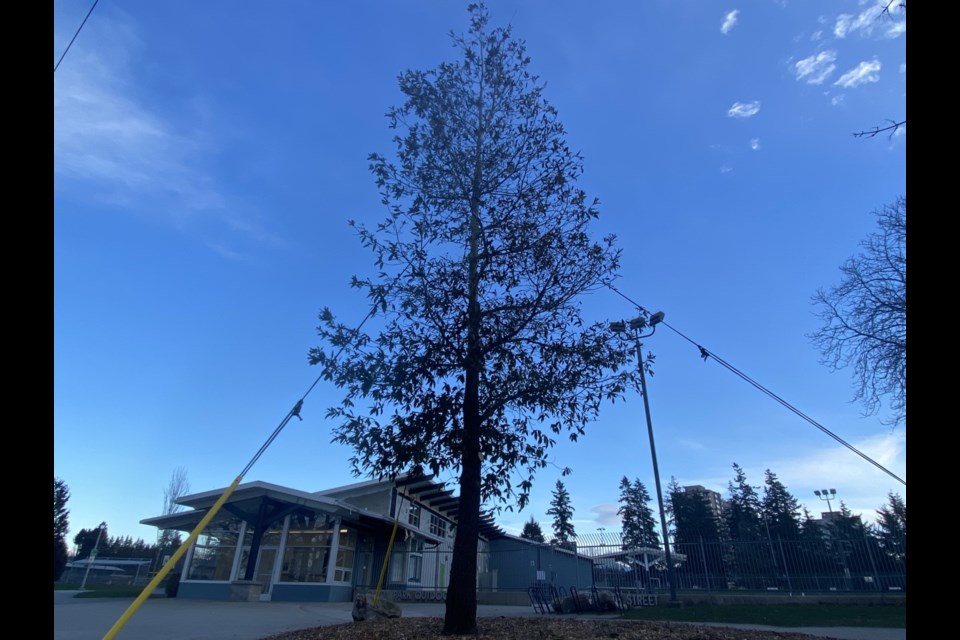A tree now taking root in Moody Park may be the only one of its kind in Canada.
New Westminster parks and recreation and engineering staff recently teamed up to relocate a rare loquat leaf oak (Quercus rysophylla) from a traffic circle at 13th Street and Seventh Avenue to the west entrance of Moody Park, near the outdoor pool. The city had to move this tree due to underground works being done on utility infrastructure.
“We understand from former city staff that the sapling was purchased at a nursery in Portland, Oregon and was grown in our greenhouse, until it was transplanted to the traffic circle between 13th Street and Seventh Avenue,” said Sylvain Martel, the city’s senior arborist. “The rare oak tree was planted by city staff approximately 10 years ago, with a hunch that it might be adaptive to the anticipated change in climate.”
Martel said the tree was moved to the west entrance of Moody Park because it’s a prominent site and is located just a few blocks from the original site’s favourable conditions – which could assist with the long-term survival of the tree.
“Quercus rysophylla (loquat leaf oak) is native to Nuevo Leon, Tamaulipa, and San Luis Potosi regions of Mexico, in the mountains at mid to low elevation,” Martel said. “The known populations are small and fragmented, resulting in a conservation status of the loquat leaf oak as ‘near threatened.’ To the knowledge of staff, local tree nurseries and regional tree experts, it is the only specimen of this oak species known to exist in the region, and possibly in Canada.”
Since being planted in New West a decade ago, the loquat leaf oak has taken a liking to local conditions.
“Although the tree was planted in a constrained location, it has doubled in size over a 10-year period and proven resilient to long periods of hot, dry weather,” Martel said. “It also survived some of our coldest winter temperatures.”
When relocating the tree to its new home in the first week of February, city staff took steps to ensure its successful in its new location.
“Staff have utilized best practices for tree transplanting, including time of year and methodology,” Martel said. “We have done what we can as tree professionals to ensure the long-term success of the tree in its new home.”
Martel said the city relocates small trees, but it’s a rare occurrence to transplant a tree of this size.
“The trunk is 33 centimetres in diameter at 1.4 metres above ground, 14 metres tall, and a canopy spread of six metres,” he said. “The tree was lifted using a 2.8-metre tree spade mounted in the back of a specialized tandem truck.”
To avoid conflict with overhead utilities, it was leaned on special truck bed for transportation to its new home. Once at its destination, the tree was lifted back and placed in a pre-dug hole and adjusted to its final position using the large spade.
Given the summer drought and weather conditions experienced in Metro Vancouver in recent years, the city relies on a list compiled by Metro Vancouver and the experience of its staff and tree nurseries when selecting tree species to plant in New Westminster, Martel said.
“With our findings, it is believed the loquat oak may be a good candidate for success in our changing climate,” he said. “In addition to our efforts to transplant and preserve the tree, staff are also collaborating with the UBC Botanical Garden and local nurseries to collect plant tissue for reproduction.”




